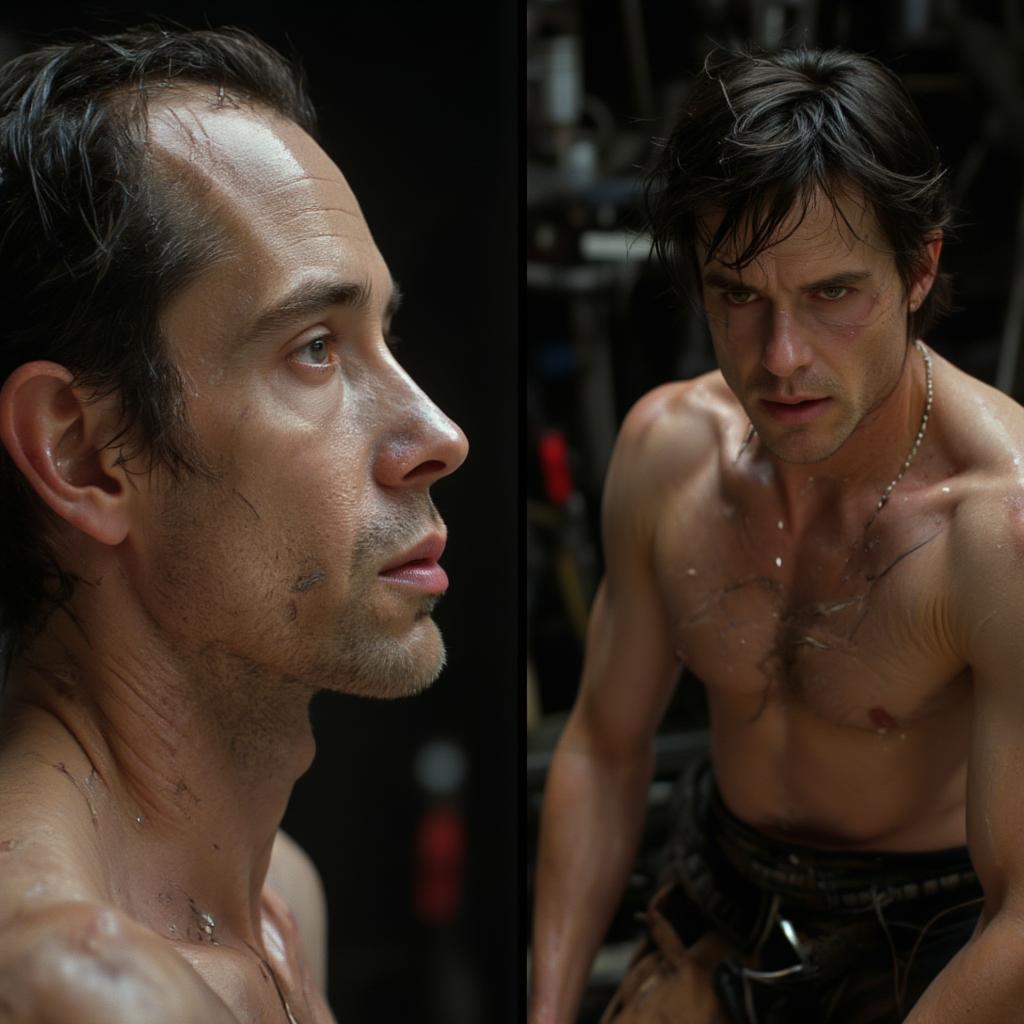Decoding Minority Report: Beyond the Pre-Crime Thriller

The 2002 film Minority Report, directed by Steven Spielberg, wasn’t just another sci-fi action flick; it plunged us headfirst into a world of predictive policing and the unsettling questions that come with it. The film explores what happens when law enforcement can foresee crimes before they occur, using psychics known as “PreCogs.” This concept, while fictional, continues to spark ethical debates and has influenced discussions around real-world predictive technologies. But how much of Minority Report is science fiction, and how much is relevant to today’s world?
The Core Concept: Pre-Crime and its Implications
At the heart of Minority Report lies the PreCrime unit, a specialized police force that stops murders before they happen, thanks to the visions of the three PreCogs. These psychics, with their fragmented and often symbolic visions, allow authorities to arrest potential criminals, often before they are even aware of their own intentions. The film’s narrative follows Detective John Anderton, head of the PreCrime unit, as he becomes an unwilling suspect, forced to question everything he believed in.
- The film questions the nature of free will: if a crime is predicted, is it inevitable?
- It brings to the surface the ethical dilemmas associated with punishing someone for a crime they haven’t yet committed.
- The PreCrime system raises the disturbing possibility of a surveillance state, with individual autonomy severely restricted.
- It touches on the themes of identity and whether we can truly know ourselves, or if our futures are dictated for us.
Real-World Parallels: Is Predictive Policing Already Here?
While we don’t have psychics predicting crime, modern technology is pushing the boundaries of predictive policing closer to reality. Big data, AI, and machine learning algorithms are now used to analyze crime patterns and forecast potential hotspots. However, there is a significant difference between predicting where crime might occur and predicting who will commit it. The potential for biases to be baked into the algorithm is a real worry, as these algorithms rely on the data they are fed and can perpetuate existing social inequalities if the data isn’t unbiased.
“The leap from analyzing historical crime data to anticipating individual criminality is a significant ethical and practical challenge. Minority Report forces us to ask where the line is, and how far we should let technology define our understanding of crime and justice.” says Dr. Evelyn Reed, a bioethics expert at the Centre for Ethical Technology Studies.
Exploring the Ethical Minefield of Pre-emptive Justice
The core question the film poses is: is it ethical to arrest and punish someone for a crime they might commit? In the world of Minority Report, the PreCrime system assumes a direct link between a PreCog vision and the certainty of a criminal act. However, this assumption is inherently problematic. Can we definitively say that a thought or a potential intention equates to the deed itself? The film doesn’t offer easy answers, but it forces the audience to grapple with this complex and troubling question.
Bias and Fallibility of Predictive Systems
Even if technology becomes advanced enough to pinpoint potential criminals, there’s no guarantee that such systems will be infallible. Minority Report underscores this very point, as John Anderton, once the system’s staunchest supporter, becomes its victim. We see how flawed the PreCog’s visions can be and how easily the system can be manipulated, highlighting the dangers of over-reliance on technology, and the importance of human oversight in matters of justice.
- The system in Minority Report assumes infallibility, which is unrealistic, and is a dangerous proposition to apply to real world technology.
- The film highlights the power of human bias even in seemingly objective processes.
- It explores the possibility of false positives, raising the risk of innocent people being wrongfully accused.

According to legal scholar, Professor Samuel Vargas, “The idea of punishing individuals based on predicted behavior is a direct attack on the principle of ‘innocent until proven guilty.’ Minority Report serves as a stark reminder that technology doesn’t eliminate bias, it amplifies it.”
The Dystopian Reality and Surveillance State
Beyond the specific challenges of predictive policing, Minority Report also paints a bleak vision of a society where personal liberty is sacrificed for the sake of security. The constant surveillance, the lack of privacy, and the erosion of individual freedom are all aspects that resonate with modern anxieties about technology’s role in society. It raises a critical question about what we are willing to give up in the name of safety. How far is too far when it comes to predictive technologies and our rights?
Impact and Relevance Today
Minority Report wasn’t just a box office hit, it also sparked ongoing discussions about the ethical boundaries of technology in law enforcement. The film remains remarkably relevant, as the real-world use of data analysis, algorithms, and even AI becomes more sophisticated. This isn’t just about future technologies; it’s also about how we use and implement technology that we already have.
The Conversation Continues
The legacy of Minority Report is not confined to the realm of entertainment. It has influenced academic research, policy debates, and artistic explorations of the role of technology in society. The film asks us to not be passive consumers of technology, but rather critical thinkers who can engage in the vital conversation about our future.
Key Takeaways from Minority Report
- Predictive policing technologies have real-world implications that need serious consideration.
- The concepts explored in the film pose difficult ethical and legal questions we must address.
- We must remain vigilant and critical of how technology is used in the name of security.
- The film prompts a necessary conversation about the delicate balance between safety and personal freedom.
“The questions Minority Report raised twenty years ago about surveillance, technology, and justice are even more pertinent now,” said Dr. Anya Sharma, professor of Media and Technological Studies, “It’s crucial we maintain an informed and critical approach to technology’s advancement.”
Conclusion: The Ongoing Debate About Pre-Crime
Minority Report is more than just a thrilling science fiction movie, it is a cautionary tale. Its exploration of predictive policing and the potential downsides of technology serves as a crucial warning for our society as we continue to develop ever more powerful tools. The ideas explored in Minority Report require a deep and on going conversation about our role in the future, about what we want to be and what we are willing to let go off. We need to continually evaluate how to balance safety with liberty, and always keep in mind that our decisions today will define how this will be used tomorrow. The lessons of Minority Report are clear: unchecked power, even in the name of the common good, can lead to a dystopian future. This is a debate that is far from over.
Frequently Asked Questions (FAQ)
Q: What is the core concept of Minority Report?
A: The core concept is “pre-crime,” where a specialized police unit called PreCrime uses the visions of psychics (PreCogs) to stop murders before they happen, raising crucial ethical questions about free will and justice.
Q: Does predictive policing exist in the real world?
A: Yes, predictive policing technologies are used today, however, most focus on predicting where crime might occur, not who will commit it, unlike the technology depicted in Minority Report.
Q: What are the ethical concerns of pre-crime systems?
A: Ethical concerns include the punishment of individuals for potential crimes they haven’t committed, the possibility of false positives, the erosion of privacy, and the potential for bias in algorithms.
Q: How accurate are the crime predictions in the film?
A: The film shows the system as prone to error and manipulation, raising questions about the validity of the data and the certainty it provides, even from seemingly infallible psychics.
Q: Is Minority Report a realistic portrayal of the future?
A: While not a literal prediction, it serves as a cautionary tale about the potential dangers of over-reliance on technology and its impact on personal liberty and civil rights.
Q: How does the film address free will?
A: The film questions the nature of free will by suggesting that if our actions are predictable, are we truly free? Can we be blamed for actions we have not yet taken?
Q: What is the long-term legacy of Minority Report?
A: It continues to spark debate about predictive technologies, surveillance, and the ethical boundaries of law enforcement, and remains relevant as technology advances.
Q: Can we prevent the dystopian scenario shown in the movie?
A: The film’s message calls for a critical, informed and engaged approach to technological development, emphasizing the importance of ethical consideration in the use of data and AI.



